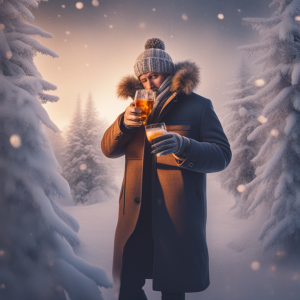Understand the Hidden Dangers of Alcohol Consumption in Freezing Temperatures
As we confront the brutal realities of winter, particularly in harsh cold climates, our instinctive craving for warmth often drives us toward the allure of alcoholic beverages. However, it is vital to recognize the significant risks associated with this choice. This article aims to illuminate the perils of drinking alcohol in frigid conditions, highlighting why this habit is not only dangerous but also ineffective for sustaining body heat. By enhancing your understanding of these risks, you can make informed decisions that prioritize your safety and well-being amid the treacherous winter elements.
Before we explore the associated dangers, it is crucial to debunk the prevalent myth that alcohol acts as a warming agent. Upon consumption, alcohol triggers the dilation of blood vessels at the skin’s surface, initially creating a deceptive sensation of warmth. While this feeling may be momentarily comforting, it does not fulfill the essential requirement of maintaining a stable core body temperature. In fact, the impact of alcohol can be detrimental, potentially impairing your ability to withstand cold weather and substantially raising the risk of severe conditions like hypothermia and other serious health issues.
 One of the most pressing dangers associated with consuming alcohol in cold conditions is the heightened risk of dehydration. Alcohol acts as a well-known diuretic, promoting increased urine production, which leads to significant fluid loss. Moreover, the cold air characteristic of winter is typically drier, causing our bodies to naturally lose moisture more quickly. The combination of these factors can result in dangerously low hydration levels, which are crucial for maintaining overall health and survival in harsh environments. Dehydration can adversely affect not only physical stamina but also cognitive functions, making it difficult to think clearly and make sound decisions in critical situations.
One of the most pressing dangers associated with consuming alcohol in cold conditions is the heightened risk of dehydration. Alcohol acts as a well-known diuretic, promoting increased urine production, which leads to significant fluid loss. Moreover, the cold air characteristic of winter is typically drier, causing our bodies to naturally lose moisture more quickly. The combination of these factors can result in dangerously low hydration levels, which are crucial for maintaining overall health and survival in harsh environments. Dehydration can adversely affect not only physical stamina but also cognitive functions, making it difficult to think clearly and make sound decisions in critical situations.
How Alcohol Consumption Affects Judgment and Awareness in Freezing Weather
Another significant consequence of drinking alcohol is its detrimental effect on cognitive function and decision-making abilities. In survival scenarios, the capacity to make clear, rational choices is paramount for ensuring personal safety. Alcohol can cloud judgment, making it increasingly challenging to respond effectively to potential hazards. This impaired reasoning can lead to accidents and poor choices, which can prove particularly catastrophic in extreme cold. Staying vigilant and aware of your surroundings is essential; however, alcohol undermines this necessity, resulting in a greater likelihood of errors that could compromise your safety and well-being.
Additionally, alcohol can severely disrupt the body’s natural temperature regulation mechanisms. When consumed, alcohol causes blood vessels in the skin to expand, which leads to increased heat loss. Although this may initially provide a fleeting sensation of warmth, over time, it accelerates the loss of core body heat, a critical factor for survival. This creates a perilous cycle where temporary warmth leads to a rapid decline in core temperature, consequently raising the risk of life-threatening conditions like hypothermia. It is crucial to understand that while alcohol might seem like a quick solution to feeling cold, it ultimately increases vulnerability to the harsh winter environment.
Understanding the Connection Between Alcohol Use and Hypothermia Risk
In discussions regarding the risk of hypothermia, it is essential to recognize how alcohol consumption can obscure the early warning signs of this perilous condition. Hypothermia arises when the body’s core temperature falls below the normal range, typically below 95 degrees Fahrenheit (35 degrees Celsius). Symptoms may include shivering, confusion, fatigue, and reduced coordination. However, alcohol suppresses our body’s natural responses, making it increasingly difficult to identify these critical indicators. By the time hypothermia symptoms become apparent, it may already be too late to avert severe injury or even life-threatening consequences.
In winter survival situations, there are numerous safer and more effective alternatives to alcohol for maintaining warmth and comfort. Implementing the following strategies can significantly enhance your ability to remain warm and safe:
1. Dress in Layers to Maximize Warmth: Using multiple layers of clothing is vital for trapping warm air effectively. Begin with thermal base layers, add insulating mid-layers, and finish with a windproof and waterproof outer layer to create a protective barrier against the cold.
2. Keep Your Clothing and Footwear Completely Dry: Moisture can lead to rapid heat loss, so it is crucial to ensure that your clothing and footwear remain dry at all times. Opting for waterproof materials and changing into dry garments whenever needed will help retain warmth and comfort.
3. Insulate Yourself from the Cold Ground: Utilizing sleeping mats or insulation pads can significantly minimize heat loss, especially during sleep. This crucial step is essential for conserving body heat during prolonged exposure to cold environments.
4. Choose Warm, Non-Alcoholic Beverages: Instead of turning to alcohol, consider enjoying hot beverages like tea, coffee, or hot chocolate. These drinks provide warmth without the adverse effects associated with alcohol consumption.
5. Seek or Build Shelter for Protection: Actively searching for or constructing a reliable shelter can dramatically reduce exposure to harsh winds and freezing temperatures. A well-constructed shelter is crucial for retaining body heat, significantly increasing your chances of staying warm and safe.
6. Fuel Your Body with High-Calorie, Nutrient-Dense Foods: Consuming nutrient-rich foods high in calories can provide your body with the energy required to generate heat. Foods such as nuts and fatty fish are excellent sources of healthy fats that can be particularly beneficial in cold conditions.
Gaining a thorough understanding of the risks linked to alcohol consumption in freezing temperatures is vital for anyone involved in winter survival scenarios. Despite the temporary feeling of warmth, alcohol can lead to dehydration, impaired decision-making, hindered temperature regulation, and can mask the symptoms of hypothermia. By avoiding alcohol and adopting safe, effective strategies, we can enhance our chances of surviving and thriving in harsh winter environments. Stay alert, prepare meticulously, and prioritize your safety above everything else.
The post Hazards of Alcohol Consumption in Extreme Cold Conditions appeared first on Survival Bite.
The Article Alcohol Consumption Hazards in Extreme Cold Conditions Was Found On https://limitsofstrategy.com

